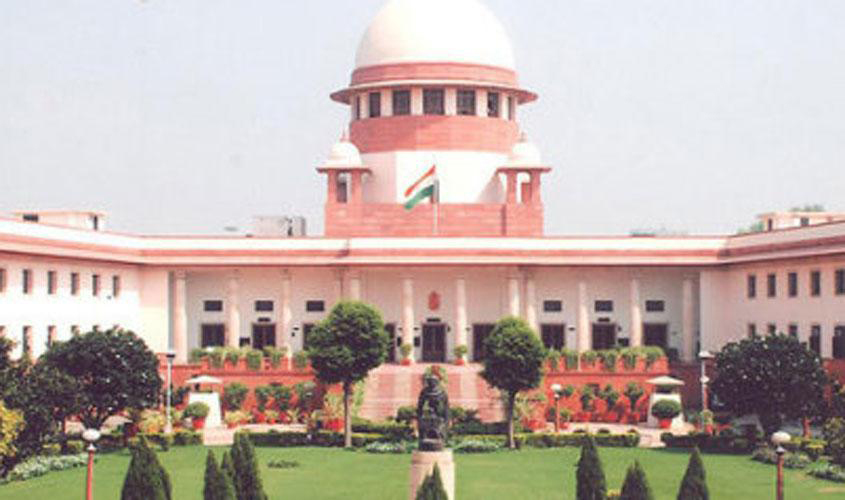 The Apex Court was in the news for all the right reasons. It struck down the instant triple talaq practice, upheld the Right to Privacy Law and granted bail to the Malegaon accused Colonel Purohit, who had been, for the last nine years, languishing in jail. The implications of the verdicts would certainly have a bearing on the daily life of citizens, and the rulings demonstrate, once and for all, that the Judiciary has had to step in, in such matters solely because the Executive and the Legislature have failed miserably to discharge their duties.
The Apex Court was in the news for all the right reasons. It struck down the instant triple talaq practice, upheld the Right to Privacy Law and granted bail to the Malegaon accused Colonel Purohit, who had been, for the last nine years, languishing in jail. The implications of the verdicts would certainly have a bearing on the daily life of citizens, and the rulings demonstrate, once and for all, that the Judiciary has had to step in, in such matters solely because the Executive and the Legislature have failed miserably to discharge their duties.
It has, over the past few decades, been observed that those in power find it more convenient to sit on decisions, thus allowing them to be endlessly delayed. The purpose is that politically controversial matters should be kept in abeyance to enable the aggrieved parties to finally move court to seek redressal. Once a legal ruling has been handed out, it would become binding on all, and thereby, facilitate the ruling dispensation to absolve itself of any inconvenient aspects.
This practice gained momentum when P.V. Narasimha Rao, while heading a government dependent on support from its allies, resorted to a safe formula promoting the theory that “no decision was the best decision”. This led to a plethora of public interest litigations, where the courts became the instrument for arriving at many rulings, which otherwise would have proved to be politically dicey. The same practice has been continued by successive governments and thereby politicians shy away from initiating measures, which could possibly land them in a political hurricane.
The latest instance where the government of the day could have easily initiated legislation to put an end to the practice of instantaneous triple talaq demonstrates that hyper-sensitive matters were allowed to be passed over. Had it not been for the Apex Court, the ambiguity over triple talaq would have continued, thus denying justice to the affected women. Similarly, in the Privacy Law issue, the government’s stand was contrary to how the Constitutional provisions were interpreted by a nine-member bench of the Supreme Court. In fact, the highest court safeguarded the rights of the common citizens which were sought to be taken over or violated by the State in one form or the other.
The consequence of the judgement is that people’s faith in the Judiciary has beyond any doubt been reinforced; both the Executive and the Legislature have much to comprehend if they have to abide by the concepts enshrined in the Indian Constitution. It is evident that short-sighted politicians and ill-informed bureaucrats continue to be detrimental to our system.
The Fathers of the Constitution had specifically laid down the functions of various organs of our framework so as to ensure that the rights of the people were not infringed on, in any manner. Inspired by Montesquieu’s theory of Separation of Power imbibed in the French and the American Constitutions for stipulating the doctrine of checks and balances, Dr B.R. Ambedkar and others underlined the functions of the Executive, the Legislature and the Judiciary. However, in the Parliamentary form of government, the Executive and the Legislature have a wafer-thin dividing line, since the Prime Minister is the head of the government and usually the Leader of the House (Lok Sabha) as well. Therefore, it is left to either the judiciary or an independent media to maintain a check on the activities of both the Government and the Legislature. The Judiciary has rarely let the people down and the media too plays its part whenever things seem to be crossing the line.
However, this does not imply that the Executive and the Legislature should cease to discharge their duties and thus wait for decisions to be taken by the courts. The MPs and MLAs are elected by the people so that they can introduce laws that would be for the betterment of the country and ensure that justice was not denied to any segment particularly the weaker sections. This can only become a reality if the democratic institutions are allowed to function without any interference. Elected governments have the proclivity of impinging on the smooth functioning of these bodies. This is what has to be desisted.
BJP patriarch L.K. Advani, in 1990 itself had initiated a debate on converting Indian democracy to a presidential form of government. However, the political events in India as well as the Gulf War involving Kuwait and Iraq received overriding priority and the issue was consigned to the back burner. In 2014, Narendra Modi’s campaign to oust the UPA had all the dimensions of a US presidential election and he was successful in pitting himself against Rahul Gandhi, a probable Congress choice. The rest is history. However, even after the installation of the BJP government, many of its supporters make occasional attempts to minimise the role of the systems and institutions. This is where the Prime Minister and his team should step in and intervene.
The judiciary is often rightly criticised for the number of never ending pending cases. Despite so, it is perhaps the only institution which has not let the country down when it matters. The Supreme Court needs to be saluted for its momentous decisions. The spotlight now is on the Executive and the Legislature to redeem themselves in the eyes of the people. Between us.

